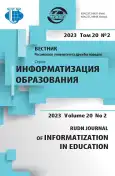Approaches to designing a model for developing students’ universal competencies within the framework of developing and implementing the Smart University concept
- 作者: Moshlyak G.A.1, Rabenatolotra A.1
-
隶属关系:
- RUDN University
- 期: 卷 20, 编号 2 (2023)
- 页面: 138-149
- 栏目: EVOLUTION OF TEACHING AND LEARNING THROUGH TECHNOLOGY
- URL: https://journal-vniispk.ru/2312-8631/article/view/321277
- DOI: https://doi.org/10.22363/2312-8631-2023-20-2-138-149
- EDN: https://elibrary.ru/KGCRFD
- ID: 321277
如何引用文章
全文:
详细
Problem statement. The authors deal with the components of universal competences in terms of applying technological innovations in the learning process. A fragment of the model for shaping universal competencies of students based on the concept of Smart University is described. The study is aimed at substantiating the approaches to designing a model for the formation of universal competencies, presenting their theoretical analysis based on the concept of Smart University and considering their features, structure, and classification. Methodology. The approach to designing a model of universal competence formation is based on the analysis of acronym SMART decoding and the structure of the concept Smart University. The matrix of overview of the concept of universal competence in a modern context is proposed. Results. The universal competences are understood as smart competences united by five types of competences: professional, motivational, adaptive, key, and digital. The formation of six groups of universal competences is justified: system and critical thinking; project development and implementation; teamwork and leadership; civic-patriotic behavior; self-organization and self-education; technological solution. The created model defines the structure of universal competences and serves as a criterion for assessing students' abilities. Conclusion. Smart competences are a response to the current economic situation. The approach is structured for educational organizations that share a development policy in combination with technology. The results may be of some interest to scholars in the field of education informatization, teachers and university managers on innovation and education policy.
作者简介
Gabriel Moshlyak
RUDN University
Email: moshlyak-ga@rudn.ru
ORCID iD: 0000-0001-7450-1244
Candidate of Historical Sciences, Associate Professor, Associate Professor of the Department of Comparative Educational Policy
6 Mikluho-Maklaya St, Moscow, 117198, Russian FederationAlexandre Rabenatolotra
RUDN University
编辑信件的主要联系方式.
Email: rabenatolotra@mail.ru
ORCID iD: 0000-0002-5211-7396
PhD student, Department of Comparative Educational Policy
6 Mikluho-Maklaya St, Moscow, 117198, Russian Federation参考
- Zueva, EG. Experience in the formation of universal competencies among students in the information and educational environment of a tourist university. The World of Education – Education in the World. 2008;(4):283‒292. (In Russ.)
- Dobryakova MS, Frumina ID, Barannikova KA, Ziila N, Moss Dzh, Remorenko IM, Hautamyaki YA. Universal competencies and new literacy: from slogans to reality. Moscow: Publishing House of the Higher School of Economics; 2020. (In Russ.) http://doi.org/10.17323/978-5-7598-2177-9
- Tarhanova IYu, Harisova IG. Educational technologies in formation of university students' universal competences. Yaroslavl Pedagogical Bulletin. Series: Pedagogical Sciences. 2018;(5):136‒145. (In Russ.) http://doi.org/10.24411/1813-145X-2018-10165
- Korotkevich AV, Luchina VN. Universal competencies for sustainable development: defining boundaries and concepts. Journal of the Belarusian State University. Series: Ecology. 2019;(2):4‒12. (In Russ.)
- Avdeeva SM, Gass PV, Kardanova EYu, Koreshnikova YuN, Kulikova AA, Orel EA, Pashchenko TV, Sorokin PS. Evaluation of universal competencies as the results of higher education. Analytical Report for the XXII April International Scientific Conference on the Problems of Economic and Social. 2021;(3). (In Russ.)
- Bourn D. Understanding global skills for 21st century professions. Cham: Palgrave Macmillan; 2018. http://doi.org/10.1007/978-3-319-97655-6
- Kaptur V. Smart universities are the foundation of sustainable cities. Smart Sustainable Cities: Technological Trends, Success Stories and Prospects. Minsk; 2019. p. 2‒8. (In Russ.)
- Uskov VL, Bakken JP, Howlett RJ, Jain LC. Smart University: conceptual modeling and systems’ design. Smart Universities. Concepts, Systems, and Technologies. Cham: Springer; 2017. p. 49‒86. http://doi.org/10.1007/978-3-319-59454-5
- Belkina VV, Makeeva TV. The concept of universal competencies of higher education. Yaroslavl Pedagogical Bulletin. Series: Pedagogical Sciences. 2018;(5):117‒126. (In Russ.)
- Subetto AI. Theory of knowledge and systemology of education (L.A. Zelenova, ed.). St. Petersburg: Asterion Publ.; 2018. (In Russ.)
- Sternberg JR. The development of adaptive competence: why cultural psychology is necessary and not just nice. Developmental Review. 2014;34(3):208‒224. http://doi.org/10.1016/j.dr.2014.05.004
- Gusev VA, Zatsepin VA, Zatsepina MYu, Lisachkina VN. Formation of adaptive competence among students of service and tourism specialties. Samara Scientific Bulletin. 2018;4(7):312‒315. (In Russ.) http://doi.org/10.17816/snv201874305
- Boldyreva NV, Boldyreva NP. Key competencies in modern conditions. Bulletin of Eurasian Science. Series: Sciences of Education. 2022;(2):1‒20. (In Russ.)
- Shvetsova OA. Smart education in high school: new perspectives in global world. Quality Management, Transport and Information Security, Information Technologies. Section 3: The Role of Smart Technologies at University. St. Petersburg; 2017. p. 688‒691. http://doi.org/10.1109/ITMQIS.2017.8085917
- Zhao Y, Sánchez Gómez MC, Pinto Llorente AM, Zhao L. Digital competence in higher education: students’ perception and personal factors. Sustainability. 2021;13(21). http://doi.org/10.3390/su132112184
- Manujlova NB, Messineva EM, Fetisov AG. Verification scheme development for universal competencies indicators. The World of Science. Pedagogy and Psychology. 2020;(2). (In Russ.)
- Kurzhals C, Graf-Vlachy L, König A. Strategic leadership and technological innovation: a comprehensive review and research agenda. Corporate Governance: An International Review. 2020;28(6):437‒464. http://doi.org/10.1111/corg.12351
- Cebrián G, Palau R, Mogas J. The smart classroom as a means to the development of ESD methodologies. Sustainability. 2020;12(7). http://doi.org/10.3390/su12073010
补充文件









